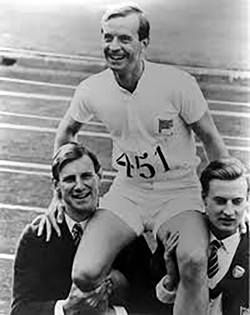The Scripture, the Movie, the Ultimate Heroism

“For the Glory of God Alone.”
Elisha and the Angelic Host and Chariots of Fire: 2 Kings 6: 16-17
Background from preceding verses:
The King of Syria had been attacking Israel and discovered that the Prophet Elisha was giving them advice that successfully defeated Syria’s attacks. When the Syrian King found out that Elisha and his servant were staying in Dothan, he sent a large military force to surround Dothan and bring back Elisha dead or alive. When Elisha’s young servant rose early the next morning, he was alarmed to see the Syrian Army had surrounded them, and he asked Elisha what they could do.
2 Kings 6: 16-17 verses
16 “Don’t be afraid,” the prophet answered: “Those who are with us are more than those who are with them.”
17 And Elisha prayed, “Open his eyes, Lord, so that he may see.” Then the Lord opened the servant’s eyes, and he looked and saw the hills full of horses and chariots of fire all around.”
The rest of the story.
Elisha asked the Lord to blind the Syrians, and it was done, and Elisha led them into the hands of the King of Israel, probably Jehoram. Their lives were spared and after a feast, they were sent back to Syria. The King of Syria, probably Ben-Hadad II, stopped Syrian raids against Israel during his reign.
The 1981 movie, Chariots of Fire
Chariots of Fire was nominated for seven academy awards and won four, including Best Picture. In the British Academy Awards, it was nominated for 11 and won three, including Best Film. It ranks 19 of the Best 100 films by the British Film Institute.
The 1981 British movie was based on a true story about the 1924 Olympics and two Gold-Medal British runners. It revolved primarily around the Scottish runner, Eric Liddell, and secondarily around Jewish runner Harold Abrahams. Liddell, “the flying Scot,” was already a famous player for Scotland’s International Rugby Team. He was also well-known as a devoted Christian, the son of Scottish missionaries to China, who on principal refused to run in the 100-meter trials on Sunday, which was Liddell’s and Britain’s best chance for a Gold Medal. He came under extreme public pressure, including the British Olympic Committee and the Prince of Wales to compromise, but he refused. Gallantly and providentially, a team-mate, Douglas Lowe, who won the 800-meter race, offered Liddell his spot in the 400-meter races on Thursday. This was considered a long-shot for Britian to win, but Liddell won the Gold Medal handily. Ironically, Abrahams was badly defeated by the Americans in his favored 200-meter run but won the 100-meter Gold Medal. Also ironically, Abrahams converted to Catholic Christianity in the 1930s,
There is a lot of good Scripture quoted in the Chariots of Fire movie but nothing directly about Chariots of Fire. The title was actually taken from a poem by Brtish author William Blake written in 1804 and published in 1808. The Title of the poem is “Bring Me My Chariot of Fire,” is about building Jerusalem (Christianity) in England. Its 16 lines are the words of a favorite British hymn, Jerusalem. It’s last four lines are:
“I will not cease from Mental Fight,
Nor shall my sword sleep in my hand,
Till we have built Jerusalem,
In England’s green and pleasant land.”
This hymn comes in the background music at the end of the film. Blake was certainly referring to 2 Kings 2:11, on Elijah’s being taken up by a whirlwind into heaven, which began with the appearance of Chariots of Fire and Horses of Fire. More likely, he was also referring to 2 Kings 6:17, where Elijah’s successor Elisha was protected from a Syrian Army force by a host of Horses and Chariots of Fire on the mountain near them and all around.
Chariots of Fire was a great movie, but it is only loosely connected to the powerful message of 2 Kings 6: 16-17, in which God reveals his usually unseen but almighty and infallible protection over his servants. Nothing can harm his servants unless He in his almighty and loving grace allows it for ultimate good.
“When God ordains anything to come to pass, His purpose in doing so is altogether and absolutely good.”—R. C. Sproul
Many other Scripture passages speak of God’s Chariots and Horses of Fire. Psalm 68;17 ESV says: “The chariots of God are twice ten thousand, thousands upon thousands; the Lord is among them, Sinai is now in the sanctuary.” Isaiah 66:15 ESV reads: “For behold the Lord will come in fire, and his chariots like the whirlwind, to render his anger in fury, and his rebuke in flames of fire.”
Hebrews 1:14, should give us the comfort that God gave Elisha and his young servant: “Are they not all ministering spirits sent out to serve for the sake of those who are to inherit salvation?”
Psalm 34: 7 reads “The angel of the Lord encamps around those who fear him, and delivers them.”
Psalm 91:11 reads “For he will command his angels concerning you to guard you in all your ways.”
Isaiah 54:17 is particularly powerful: “No weapon that is fashioned against you shall succeed, and you shall refute every tongue that rises against you in judgment. This is the heritage of the servants of the LORD and their vindication from me, declares the LORD.”
Some of the most moving Scripture in the movie is Eric Liddell’s Sunday Scripture reading of Isaiah 40 at the Church of Scotland in Pariis This included verses 28-31:
“Hast thou not known? Hast thou not heard that the everlasting God, the Lord, the Creator of the ends of the earth, fainteth not, neither is weary? There is no searching of his understanding. He giveth power to the faint; and to them that have no might he increases strength. Even the youths shall faint and be weary, and the young men shall utterly fall: But they that wait upon the Lord shall renew their strength; they shall mount up with wings as eagles; they shall run, and not be weary; and they shall walk, and not faint.”
Perhaps the most directly relevant Scripture, however, was actually a paraphrase of 1 Samuel 2:30, given to Liddell by his British running teammates at his hotel just before his 400-meter triumph. It was delivered by his masseur. Some versions of the movie have the note coming from American runner, Jackson Scholz, but that is “movie fiction.” This is what I believe was the de-fictionalized note:
"It says in the Old Book, 'He that honors me, I will honor.”
Eric Liddell—the rest of the story and ultimate heroism.
In 1925, Eric Liddell returned to China, where he was born of missionary parents in 1902. He became a missionary teacher. Except for two furloughs in Scotland, he remained in China for the rest of his life. In 1932, on a furlough to Scotland, he was ordained a minister of the Congregational Union of Scotland. On returning to China the same year, he married Florence Mackenzie, the daughter of Canadian missionary parents. In 1941, the British government advised British nationals to leave China, because of the dangerous conflict with Japan. He sent his two daughters and Florence, pregnant with a third daughter, to Canada to stay with Florence’s parents. In 1943, the Japanese interned Liddell, and other missionaries and their children in a prison camp at Weifang, Shandong, about 325 miles SE of Beijing. There were 1,800 foreigners there, including 327 children, many of whom had been separated from their parents during the Japanese invasion. Liddell became a leader in the camp and busied himself by helping the elderly, teaching Bible classes and science to the children at the camp school, and arranging and refereeing sports games. He was also in charge of one of the boys’ dorms. The children loved him and referred to him as “Uncle Eric.”
He finally decided that refereeing the children’s games of hockey, basketball, and rounders on Sunday was a ministry of necessary compassion. Liddell was never a legalist. He was selfless and put the glory of God before all other considerations. He was, in fact, unusually compassionate and willing to serve others. He was absolutely dedicated to ministering to the missionary children in every way. He poured himself into their lives and made every effort to capture their imagination. According to fellow prisoner, Langdon Gilkey, who later became a prominent theologian in the United States, Liddell “was overflowing with good humor and love for life, and with enthusiasm and charm. It is rare indeed that a person has the good fortune to meet a saint, but he came as close to it as anyone I have ever known.”
Liddell died on February 21, 1945, five months before liberation by American paratroopers. He was malnourished, frequently sick and hospitalized, overworked, physically exhausted, and shared with his wife by letter that very day that he was near a nervous breakdown. He was probably suffering from an undiagnosed brain tumor.
According to Randy Alcorn (https://www.epm.org/blog/2018/Feb/12/olympian-eric-liddell), Eric Liddell had an enormous impact on the spiritual determination and development of the survivors and especially the children of the internment camp. This has since been multiplied to generations of their own future families.
According to Dr. David J. Michell, who was one of the children in the camp, “Uncle Eric” taught all the children his favorite hymn:
“By still, my soul, the Lord is on thy side;
Bear patiently the cross of grief or pain;
Leave to thy God to order and provide;
In every change He faithful will remain
Be still, my soul, thy best, thy heavenly Friend
Through thorny ways leads to a joyful end.”
When Eric Liddell died, all of Scotland mourned. They were joined by millions of others around the world. Eric Liddell’s grave, marked by a wooden cross, was identified by fellow Scot, Charles T. Walker, in 1990, next to the camp’s now sprawling Weifang Middle School 2. A foundation arranged for an inscribed commemorative stone marker. Walker and many others believe Eric Liddell is one of Scotland’s greatest heroes. Here is a final 3 minute and 31 memory from the movie, Chariots of Fire.









 Mike Scruggs is the author of two books: The Un-Civil War: Shattering the Historical Myths; and Lessons from the Vietnam War: Truths the Media Never Told You, and over 600 articles on military history, national security, intelligent design, genealogical genetics, immigration, current political affairs, Islam, and the Middle East.
Mike Scruggs is the author of two books: The Un-Civil War: Shattering the Historical Myths; and Lessons from the Vietnam War: Truths the Media Never Told You, and over 600 articles on military history, national security, intelligent design, genealogical genetics, immigration, current political affairs, Islam, and the Middle East. 


